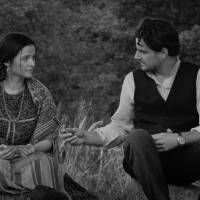"Papusza" is a fascinating if bleak portrait of Polish-Romany poet Bronislawa Wajs, better known by her Roma — or Gypsy — name Papusza ("doll"). It's a decidedly unromantic look at Roma life, covering the 1940s and '50s, which saw two-thirds of Poland's Roma community massacred by the Nazis and the rest banned from living the caravan lifestyle after the war.
Born in 1908, Papusza (played by Jowita Budnik) manages to learn to read by stealing chickens to trade for lessons with local villagers; the Roma themselves discouraged education as a corrupting outside influence and, though Papusza was mocked for her efforts, she persisted. Discovered by Polish poet Jerzy Ficowski in 1949, Papusza's works were published, but this only served to inflame the Roma community even more, who saw her as betraying their culture to outsiders. With its austere black-and-white cinematography and unrelenting depiction of a merciless world, the film should appeal to fans of Michael Haneke's "The White Ribbon," although the constant presence of rollicking Roma music adds a layer of resilience and joy that Haneke would never allow.
| Rating | |
|---|---|
| Director | Joanna Kos-Krauze, Krzysztof Krauze |
| Language | Polish, Romany (subtitled in Japanese) |
| Opens | April 4 |



















With your current subscription plan you can comment on stories. However, before writing your first comment, please create a display name in the Profile section of your subscriber account page.